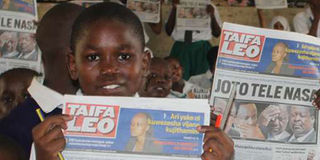The job of a reporter is not to simply write what he is told

Pupils of Sacred Heart Primary School in Mombasa display the Taifa Leo newspaper on March 22, 2017, during a Kiswahili lesson. The purpose of fact-checking is to ensure that the truth is heard. PHOTO | WACHIRA MWANGI | NATION MEDIA GROUP
What you need to know:
- NMG is already fact-checking politically sensitive stories although not all are fact-checked.
- Ideally, however, fact-checking should be done when the story is published.
Prof Caxton Muune says Kenyan elections have always been seasons of civil violence and the Nation Media Group (NMG) cannot afford to be negligent in the way it covers political news, especially of a sensitive nature.
One of the examples he gives is the June 6 Daily Nation story, ‘Mumias Sugar Company Director of Legal Services shot dead’.
In the story Nasa presidential candidate Raila Odinga, while calling on Kenyans to vote out the Jubilee government, is quoted saying: “The Jubilee government killed my friend Jacob Juma.
"Yesterday (Sunday), they killed Mumias Sugar Company Secretary Ronald Lubya. He opposed a scheme to import sugar from Sudan to Uganda.
"They wanted the sugar to be labelled that it had been manufactured by Mumias."
FACT-CHECKING
He said NMG should have challenged Mr Odinga “to produce evidence, and/or at the very least seek some detailed explanations, clarifications and necessary details, which has again created the wrong impression by reinforcing the unsubstantiated allegations".
Prof Muune is, in fact, talking about fact-checking, fairness and balance.
I want to confine myself to fact-checking. NMG is already fact-checking politically sensitive stories although not all are fact-checked, including the one cited by Prof Muune.
TRUTHFULNESS
The purpose of fact-checking is to ensure that the truth is heard.
However, it is not always possible to check all stories immediately or to prove or disprove all the facts, especially in a political story.
Political stories are typically laden with half-truths and spin.
They are part of political campaigning and there is often a clash of views of what the facts are.
JOHO'S ALLEGATIONS
Journalists must assess what the facts really are.
For example, how do you fact-check a statement like this by Governor Hassan Joho at a Nasa rally in Machakos on June 4: “Can somebody who was unable to pay teachers, somebody who was unable to bring laptops, somebody who was unable to bring electricity to schools, really pay fees for schoolchildren?”
This is what the Nation said by way of fact-checking: “The government has been able to get electricity to schools, and has also arrived at a collective bargaining agreement with teachers after a long strike, although teachers are yet to be paid.
"However, it has demonstrably fallen behind its ambitious 2013 laptop promise. Governor Joho’s claim is, therefore, unproven.”
BALLOT TENDER
Fact-checking takes time. Some stories cannot be fact-checked before publication.
Ideally, however, fact-checking should be done when the story is published.
The Daily Nation tried to do that in yesterday’s (Thursday) story, ‘Nasa wants ballot contract to Dubai company revoked’.
The story was peppered with snippets of fact-checking such as the following extract: “We want President Uhuru Kenyatta to come clean on his and his family’s links with the Dubai firm and state his interests in the contract that the firm was awarded.
"The interest, in our view, is clear. The President and his Jubilee team are looking for a firm that can supply extra ballots secretly as was the case in 2013,” said Mr Mudavadi…. There is no evidence that additional ballot papers were printed in 2013.”
ELECTIONS
The Nation has fact-checked many claims by politicians, including the truth about free secondary education promises, milk and maize payments to farmers.
Clearly, readers want more fact-checking this election period.
This brings me to a parable found in the bestselling book Flat Earth News by British journalist Nick Davies on falsehood, distortion and propaganda in journalism.
CRITICAL REPORTING
A reporter is assigned to write a story on what the weather will be like tomorrow.
He interviews a woman in the room. She says it will be sunny. Then he interviews a man in another room.
He says it will rain. Then he writes a “balanced” story saying a woman said it will be sunny and a man said it will rain tomorrow.
The moral of the story is that it’s not the job of a reporter to simply write what he has been told. It’s his job to look out the window.
Send your complaints to [email protected]; text or call 0721989264.





